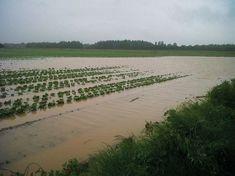
When Britain was hotter than Morocco in May, with temperatures hitting 26°, you couldn’t blame growers for having a positive outlook for the summer. With the Jubilee, Wimbledon and the Olympics still to come, it all looked set to be a vintage season.
But Britain’s wild weather patterns have brought a sharp spike in temperatures over the past few months as the country veers from colder than the Arctic to hotter than parts of Africa. And that’s without even mentioning the rain.
“When we had 26° we had an order of over 150 pallets of cucumbers. The next day there was torrential rain and our orders went down to two pallets,” says Brian Hibberd, MD of Abbey View Produce.
Abbey View supplies 70 per cent of the lettuces in Sainsbury’s and is one of many producers watching orders live and die based around the unpredictable weather. “The rain’s combined impact of less yield and less demand has seen the whole fresh produce industry suffer,” he adds.
Hibberd is by no means a lone voice, and in fact reflects a widely held view across the trade. “This is the worst year I can ever remember for UK growers,” admits Greville Richards, MD of Cornwall-based Southern England Farms. With brassicas dependent on consistent temperatures, the wet weather has played havoc with production and Richards fears the winter crop of cauliflower may not be ready in time.
“The biggest concern is the winter cauliflower,” he elaborates. “Ideally it needs to be in the ground by the last week of June and for all of July, but it still hasn’t been planted.” Richards also has fears for this year’s courgettes, saying the crop is a major problem for the first time in recent memory. “They have suffered since being in the ground in March with everything from frost, high winds and rainfall to up-and-down temperatures. The wind has hit them to the stage where we’ve had to completely write off yellow and baby courgette production; current volume is nowhere near 100 per cent.”
Traditionally temperatures on the south coast have held up well, but Alex Duncan of supplier Langmead Farms has been up against it on his Chichester-based land. “It has been a disastrous year as the weather has been so unseasonably cold; usually we’d expect 25-30° on the south coast and we are only hitting 16°,” says Duncan. “Our target budget weight on lettuces is 550 grams, but we are struggling to hit 400g so that shows you just how much damage the rain has caused.”
The wet and cold weather has seen disease increase and the NFU’s north-west chairman, Chris Hewitt, believes growers have a tough task dealing with the issue. “When we have extremes of heat we can irrigate, but wet and cold conditions are difficult to combat,” he explains. “We all have field drains but we cannot account for the extremes of cold. If we look at putting fleece down on crops at this time of the year that only creates a breeding ground for disease.”
And disease has been a huge collateral issue for growers, Duncan adds. “Our spinach has had massive leaf damage and disease with the rain, making its crop more or less redundant.”
Mike Green of Kent-based grower Mansfields believes a lack of proper pollination has been the root cause behind an influx of disease. “The pollination time is poor due to wet and damp conditions,” he points out. “Temperatures are low and so are poor for insects to work, resulting in a crop that’s less heavy and more vulnerable to the likes of mildew and slugs.”
Confidence hasn’t only dipped among growers, with shoppers turned off from tucking into soft fruit during spells of miserable weather. “Soft fruit is weather dependent and if you look at the north of England, people are up to their knees in rain, so eating a bowl of strawberries isn’t the most favourable option,” adds Green.
Hewitt, echoing the words of the Catalyst for Change report, believes supermarkets do not back grower programmes strongly enough and their attitude can put too much pressure on producers. “Traditionally in times like this, supermarkets don’t come to the aid of the grower, which then makes producers pump major volumes into wholesale. If a supermarket-affiliated grower is committed to a programme, there should be liability for the supermarket too. If they suddenly reduce orders one week by 50 per cent due to a lack of demand, why should the producer face all the blowback?”
Many in the fresh produce industry are already looking towards next season with everything crossed. “I just pray the weather isn’t as bad next year,” concludes Richards. “Let’s hope the UK can be the one exporting rather than importing and the sun makes a much more consistent appearance.” -
QUOTE: James Hallett, Chief executive
British Growers’ Association
“British growers are working incredibly hard to maintain availability of high-quality vegetable and salad crops for consumers. The weather of the past few months has clearly made growing and harvesting extremely difficult across the country. It has also had significant effects on demand patterns. Overall it is too early to predict final volume outcomes. Likewise the impacts on profitability owing to differing yields and costs are yet to be fully assessed. British growers throughout the country are investing huge amounts of their time and money in continuing to produce the best crops possible for British consumers to enjoy.”



